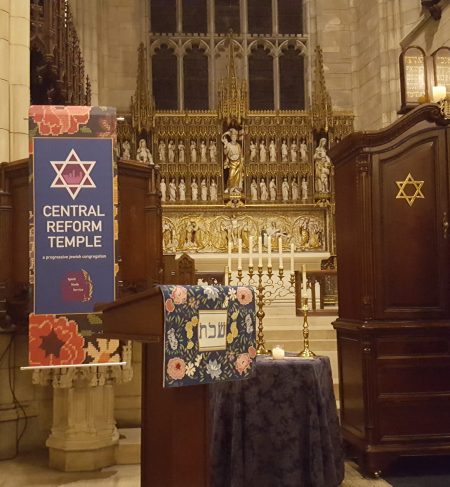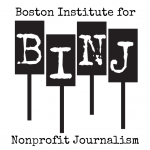PHOTOS BY CLAIRE SADAR
How do you counter a violent racist bent on destroying intercommunal solidarity? With more intercommunal solidarity.
On Oct 27, one year after the shooting at the Tree of Life Synagogue in Pittsburgh, thousands around the country and around the world remembered, prayed, and paused for the victims of the deadliest act of anti-Semitic violence in American history. However, a handful of Jewish Bostonians decided that memorializing this terrible day from afar was not enough.
Twice a year, the small Central Reform Temple’s Rabbi Howard Berman leads trips exploring Jewish history both domestically and abroad, dubbed “Touring as Torah.” The group has visited cities ranging from Savannah, Georgia, and Montreal, Quebec, to Cordoba, Spain, and Auschwitz-Birkenau in Poland. They have seen some of the significant, and most horrific, sites in Jewish history. For American Jews in particular, Pittsburgh now has a prominent place among that history. But in Pittsburgh, the wounds are still not healed, the pain is still fresh, and history is still being written. The group from the Central Reform Temple traveled to Pittsburgh to not only observe Jewish history, but to become absorbed in it. What Rabbi Berman called a “pilgrimage of memorial and solidarity.”

Speaking to his congregation a week after the trip, he reminded those gathered that intercommunal solidarity was an important trigger for the violence. “Tree of Life was targeted specifically because two of the three congregations had supported immigrants and refugees being resettled in the Pittsburgh area,” Rabbi Berman said. “I felt we had an obligation to bear witness, and stand in solidarity with the people of Pittsburgh, with the three congregations that were attacked, and who all lost members among the 11 martyrs.”
When he first decided to make Pittsburgh the domestic destination for Touring as Torah this year, Rabbi Berman figured he would be joining groups from around the country. To his surprise, the group he led, numbering a felicitous 11 individuals, was one of the few who choose to travel to Pittsburgh on the anniversary of the shooting. For their part, members of Pittsburgh’s Jewish community were surprised that a group had come all the way from Boston just to support them during this difficult weekend. “Wait, you’re not here for the Bat Mitzvah?” a member of the Rodef Shalom asked, eliciting a rumble of laughter, after his rabbi explained why their Saturday morning Torah study group had suddenly doubled in size.
In addition to Torah study, CRT’s trip included Shabbat services with two of the three congregations that lost members in the shooting and a visit to the Tree of Life building, which has yet to be reopened. They also attended the public memorial service held at Soldiers and Sailors Hall on Sunday evening.
 For members of the Central Reform Temple, the services and interaction with the congregations impacted by the shooting was deeply affecting. “I didn’t have a sense of the impact of the shooting until I saw these congregations in the flesh,” Leslie Warshaw, from one of the groups, told me. She was surprised at how moved she was by the experience of worshiping with the impacted congregations. “I did not expect that it would feel so much like it had happened to me. I felt violated, in a sense.”
For members of the Central Reform Temple, the services and interaction with the congregations impacted by the shooting was deeply affecting. “I didn’t have a sense of the impact of the shooting until I saw these congregations in the flesh,” Leslie Warshaw, from one of the groups, told me. She was surprised at how moved she was by the experience of worshiping with the impacted congregations. “I did not expect that it would feel so much like it had happened to me. I felt violated, in a sense.”
For Bob Frank, another member of the group, what he experienced in Pittsburgh solidified his growing sense that he can’t ignore his Jewish background. “I am often not very Jewish at all, but I have learned that it is not an option. … Trying to be just American with Jewish ancestors is something that is not possible.”
However, these same participants also agreed that some of the most poignant and moving moments of the trip occurred not during the worship services with the affected congregations, but at the public memorial held at the Soldiers and Sailors hall on Sunday evening. The memorial began with athletes from the University of Pittsburgh walking down the aisles of the auditorium and placing flowers on the stage. Bob Frank and Jennifer Coplon were surprised to find themselves in tears as they watched this solemn procession of young people who largely had no direct connection to the Jewish community or congregations impacted.
Rabbi Berman was unable to attend the Sunday evening memorial, as he was scheduled to speak at the opening of the art exhibition Abraham: Out of One, Many at Boston’s St. Paul Cathedral. In the wake of the Tree of Life attack, Reverend Amy McCreath, dean of the cathedral, found herself, like Rabbi Berman, looking for ways to strengthen interfaith and intercommunal ties. In partnership with Central Reform Temple, Emmanual Church, and Dar Al-Islam Jummah gathering, among other organizations, the exhibition and connected series of events is specifically designed to bring together members of different faith traditions and deepen ties between the communities.
At home in Boston, the members of the Central Reform Temple practice and preach interfaith cooperation every time they hold a Shabbat service. Their home sanctuary is the gothic side-chapel of Emmanuel Episcopal Church, with which they just signed a spiritual covenant—an official recognition of the two congregations’ 15-year relationship. On the Friday following their trip, Rabbi Berman shared his reflections on his experience in Pittsburgh with his congregation. “I had always held that as a principle of faith as an American Jew… that there had never [been] organized persecution, pogroms, concentration camps, or any of those things that had darkened our history everywhere else,” Rabbi Berman said. The violence in Pittsburgh had changed that. However, what he found in Pittsburgh was healing, hope, and, most significantly, overwhelming intercommunal and interfaith solidarity.
He then shared that the two most important moments of the trip, for him, were signs of this solidarity from outside the Jewish community.
On Saturday morning, before the service at Rodef Shalom with Dor Hadash, he went to the nearby church where Tree of Life was holding its morning service. Outside, as they have for a year, members of the Pittsburgh Muslim Community stood with signs welcoming their Jewish neighbors and wishing them a peaceful Sabbath.
Later that day, at the Tree of Life building, he was struck by the artwork from students attending Margery Stoneman Douglas High School in Parkland, Florida, and Columbine High School in Columbine, Colorado, that adorns the chain-link fence that now envelopes the building. Out of the horror of what happened, he told the congregation, this was the blessing that had emerged. Then, under the gaze of Jesus, Mary, and a choir of Christian saints, the congregation said Kaddish for the Pittsburgh martyrs.









